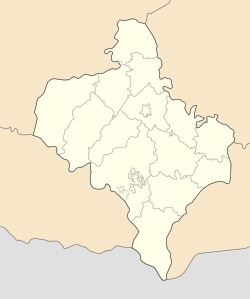Bolekhiv
|
Bolekhiv Болехів Bolechów |
||
|---|---|---|
| City of regional significance | ||

Church of the Assumption
|
||
|
||
| Location of Bolekhiv in Ivano-Frankivsk Oblast | ||
| Coordinates: 49°04′01″N 23°51′05″E / 49.06694°N 23.85139°ECoordinates: 49°04′01″N 23°51′05″E / 49.06694°N 23.85139°E | ||
| Country |
|
|
| Region | Ivano-Frankivsk Oblast | |
| Subdivisions |
List
|
|
| Government | ||
| • Mayor | Bohdan Melnyk | |
| Population (2016) | ||
| • Total | 21,610 | |
| Time zone | EET (UTC+2) | |
| • Summer (DST) | EEST (UTC+3) | |
| Area code | 380- | |
| Website | City website | |
Bolekhiv (Ukrainian: Болехів; Polish: Bolechów; Yiddish: באָלעכאָוו) is a regional city in Ivano-Frankivsk Oblast (province) of Ukraine. It was once home to a large Jewish community, very few of whom survived World War II. Administratively, Bolekhiv is incorporated as a city of regional significance. Population: 21,610 (2016 est.).
Bolekhiv, is first mentioned in historical records in 1371 after the defeat of the Kingdom of Galicia–Volhynia to Poland. During the Galicia–Volhynia Wars in the 14th century, Bolekhiv was variously held by Poland, Hungary (Danylo Dazhbohovych), and Lithuania. Subsequently, King Jogaila of Poland succeeded and Bolekhiv became part of the Kingdom of Poland.
In 1546, Emilia Hrosovska established a salt refinery in the town. In 1603, Sigismund III Vasa gave the town the Magdeburg rights. At that time, the Bolekhiv region was involved with the Opryshky movement led by Oleksa Dovbush and German colonists arrived.
...
Wikipedia


